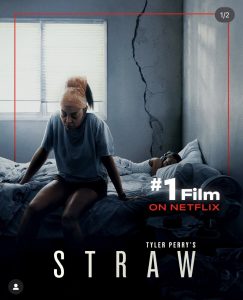I love good movies, especially those that shine a light on real societal issues, or ones I can truly relate to. And if the ending surprises me, even better, because it keeps my restless ADHD brain fully engaged.
I’ve been a fan of Tyler Perry since the early Madea days, and I’m also drawn to any movie that features Taraji P. Henson. So when STRAW, Tyler Perry’s latest film starring Taraji and other fantastic cast, arrived on Netflix, I couldn’t resist.
Before I watched it, I’d already seen a mix of reactions online. Some said they cried, got emotional, were completely moved. Others admitted it was a great film, worth the watch, but didn’t shed a single tear. Of course, the emotional crowd was quick to label the ones who didn’t cry as “stone-hearted,” even comparing them to Tessa, a character in the movie who seemed cold and unmoved by the struggles of a fellow Black woman.
But here’s what I realized after I watching the movie, those who cried did so because they saw themselves or someone they love in Janiyah Wilkinson (played brilliantly by Taraji).
If you haven’t been a single mother fighting relentlessly just to put food on the table, or haven’t been raised by one; if you never grew up where having a stable home was a luxury; if you haven’t endured serious health struggles without a clear path of support; if you’ve never felt helpless or lacked a safety net, then maybe the story won’t hit you in the same way.
So, to those who weren’t moved, I can only assume life has been kinder to you, and honestly, that’s a blessing if you ask me.
For many of us who cried, it was because we saw our own past lives unfold on that big screen, a raw, honest reflection of the pain we once carried deep inside. It brought back memories we hadn’t touched in a long time, stirring a bittersweet nostalgia. Sometimes, the tears came from the pain of those we love, and the reality that so many Black women right now are facing similar battles. What hurts even more is knowing that many of them aren’t getting the support or help they desperately need.
Some of my favorite lines from the movie however hit hard:
-
“I just want to do what’s right for my baby,” Janiyah had said about a child she had already lost to the cold hands of death, yet still holding on, living in denial of the pain. That hit differently.
-
“I am right here with you.” If I ever heard someone say that with real meaning, I’d never leave either.
-
And the line that had me yelling in agreement: “People don’t know how expensive it is to be poor.”
-
And to every young Black girl watching, the film’s message is clear: “You gotta be careful who you have a baby with.”
I also appreciated that her baby’s father was never a focus in the story , a solid reminder that you don’t have to co-parent if it’s not right for you.
STRAW was heavy, real, and raw. I connected deeply because I’ve been through some of those struggles. But through it all, I never lost myself. My hope is that those still fighting in similar situations find the support, shift, and healing they desperately need.
Straw tells the compelling story of a single mother who, despite losing her daughter just a day earlier, lived in denial and carried on with the daily routines they used to do together as if her daughter was alive. She bathed her daughter in her imagination and took her to school in an imaginary world, almost as if she were in a trance.
However, her struggle with grief quickly spiraled into a series of devastating consequences: hallucinations cost her job, she lost her car, became entangled in a robbery at her workplace and in a sudden surge of anger, accidentally caused her boss’s death. Adding to her troubles, she was falsely accused of being a bank robber. This powerful film further tells Africans not to make light of the issue of mental health.
For me? This movie is a solid 10 out of 10.


Born as Titilayo Oladimeji, I have been known by the nickname Titipetral for nearly two decades. I am a Financial Advisor at a reputable financial institution in Lagos, Nigeria, with over 10 years of experience in Financial Advisory and Credit Analysis. I am also an author and the founder of Titipetral Publishers, a duly registered publishing company.
In addition, I lead the Titipetral Empowerment and Development Network (TEDN), a duly registered philanthropic initiative dedicated to supporting underprivileged girls, boys, women, and men in the Alimosho area, Nigeria’s most populated local government, focusing on serving the underserved.
For inquiries or collaboration, you can reach me at Titilayooladimeji@titipetral.com or titipetral@gmail.com.
